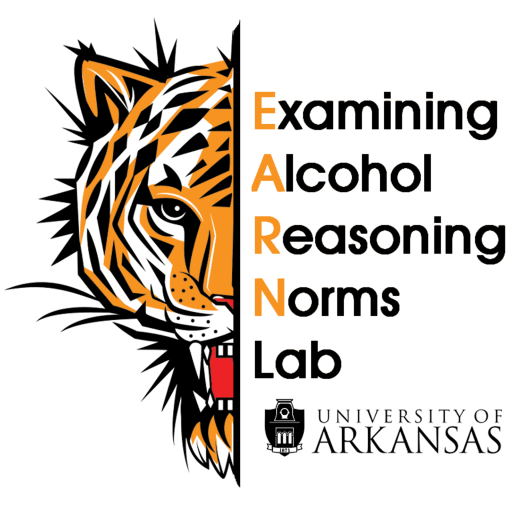
E.A.R.N Lab Team
“You are entitled to nothing…you build your future, it isn’t handed to you.”
-Frank Underwood, House of Cards

Kayla Ford
M.A. Clinical Psychology, University of Arkansas, 2022
Kayla is a fourth-year doctoral student in the Clinical Psychology program. Her research focuses on psychosocial predictors of hazardous drinking practices, as well as emotional and cognitive processes in response to alcohol-involved transgressions. She has particular interests in how these factors influence sexual aggression while intoxicated, as well as the role of bystanders in helping prevent harmful outcomes for survivors of sexual violence.
Favorite TV show: Lucifer and any reality TV
Song Title that Best Describes her Work in the E.A.R.N. Lab: High Hopes by Panic at the Disco

Patrick McClain
B.A Psychology, University of Arkansas 2022
Patrick McClain is a doctoral student in the experimental psychology program at the University of Arkansas. His research focuses on alcohol protective behavioral strategies, risky drinking practices (drinking games, pregaming), and drinking motives (motives for general alcohol use, motives to pregame, motives to play drinking games).
His hobbies include building computer systems, media production, and playing video games
Song Title that Best Describes his Work in the E.A.R.N. Lab: “Coffee“ by Jack Stauber

Michael Randazza
M.S., Clinical Research Methodology, Fordham University, 2022
Michael is a first-year doctoral student in the Clinical Psychology program. His research interests lie at the intersection of alcohol use, anxiety disorders, and treatment modification in situations where these constructs co-occur. His research has focused on mechanisms which foster the common comorbidity of OCD and substance misuse, as well as alcohol’s effect on extinction learning processes. Currently, he is investigating drinking motives and solitary drinking amongst young adults
Song Title that Best Describes his Work in the E.A.R.N. Lab: “Eye of the Tiger” by Survivor
U.S. Collaborators from other Universities
“Good teams become great ones when the members trust each other enough to surrender the ‘Me’ for the ‘We’.” -Phil Jackson

Dr. Heidemarie Blumenthal
Associate Professor at the University of North Texas
Dr. Heidemarie Blumenthal is currently an Associate Professor at the University of North Texas. She received her degree from the University of Arkansas under the mentorship of Dr. Ellen W. Leen-Feldner (and Dr. William Levine at the undergraduate level). Dr. Blumenthal’s core program focuses on the etiology of maladaptive stress responding and risk behaviors, with an emphasis on the dynamic interplay of anxiety and substance use among adolescents and emerging adults. She also centers a harm reduction perspective in her work, and her team engages in collaborative efforts that are aimed at identifying developmentally and contextually relevant risks, broad-based protective factors, as well as safer use choices, via rigorous real-time research design. Dr. Blumenthal also is the proud co-sponsor for UNT Psi Chi, and she welcomes UNT undergraduate, post-bachelors volunteer, and graduate student (Behavioral Science primarily) applications.

Linda Thompson
M.A. Psychology, San Diego State University, 2021
Linda Thompson is a second-year doctoral student in the Behavioral Science program at the University of North Texas working under the guidance of Dr. Blumenthal. Her research interests include understanding the effects of trauma, sleep, and substance use motives on health outcomes. Her current cross-collaboration research activities include testing new alcohol level detection devices, identifying immigration-related factors associated with sleep health, and researching drinking games.

Banan Ramarushton
M.S. in Psychology from the University of North Texas
Banan Ramarushton is a fourth-year doctoral student in the Behavioral Science program at the University of North Texas working under the guidance of Dr. Heidemarie Blumenthal. Her research focuses on psychopathological precedents of alcohol use problems, particularly risky motives for use. She is currently involved in cross-team collaborations involving trauma, sleep, and drinking game research.

Dr. Jennifer Merrill
Associate Professor at Brown University
Jennifer Merrill is an Associate Professor in the Department of Behavioral and Social Sciences at Brown University. She has primarily focused on investigating the etiology and consequences of alcohol misuse among young adults, with a particular interest in the subjective evaluation of alcohol-related consequences. She is funded by NIAAA to study drinking patterns, proximal antecedents, and consequences of both high-intensity drinking and alcohol-induced blackouts among emerging adults. Dr. Merrill has expertise in qualitative methods, ecological momentary assessment, alcohol biosensors, advanced data analysis, and intervention development.

Dr. Amie Newins
Associate Professor at the University of Central Florida
Dr. Newins received her B.A. in Psychology from Mercer University and her M.S. and Ph.D. in Clinical Psychology from Virginia Tech. She completed her pre-doctoral clinical internship at the Durham VA Medical Center. She then worked as a post-doctoral fellow in the Mental Illness Research and Treatment fellowship program at the VISN 6 Mental Illness Research, Education, and Clinical Center and the Durham VA Medical Center. Following her fellowship, she worked as a Staff Psychologist in the Substance Use Disorders Clinics of the Durham VA Medical Center before joining the faculty at UCF.
Dr. Newins conducts research on the relationship between anxiety and behaviors and events that are associated with health risk. In particular, she is interested in the identification of risk factors for sexual assault victimization and alcohol misuse and the impact of adverse life events on behavioral health outcomes. She is also involved in multiple research studies on the treatment of trauma-related disorders.

Dr. Lucy Napper
Associate Professor at Lehigh University
Dr. Lucy Napper is an Associate Professor at Lehigh University in the Department of Psychology and Health, Medicine, & Society Program. Dr. Napper’s research focuses on responses to health-risk information, attitude and behavior change, and the assessment of health-related cognition and behaviors. She explores factors that influence perceptions of health risks and health behaviors. This includes the influence of peers and parents on substance use and sexual risk behaviors of emerging adults. Building on this line of research, she also studies the efficacy of interventions aimed at reducing substance use and associated risks, including ways to promote effective parent communication about health risks during emerging adulthood. Her quantitative interests focus on psychometrics, including the development and evaluation of measures related to substance use, mental health, and sexual risk. For example, she is currently working on projects examining the assessment of communication motives and drinking game outcomes.

Dr. Michael Madson
Professor at the University of Southern Mississippi
Dr. Michael Madson is a professor in the School of Psychology at the University of Southern Mississippi. In the Behavioral and Addiction Research Lab, Dr. Madson studies social-cognitive and mental health predictors of college student safe and harmful use of alcohol and cannabis as well as factors related to addiction. Specifically, Dr. Madson’s work seeks to help understand what factors such as drinking motives or anxiety serve as facilitators or barriers to students’ use of alcohol or cannabis protective behavioral strategies when using those substances. Further, he examines the development, training, implementation, and effectiveness of brief motivational interventions that promote harm reduction and health behavior.

Dr. Seth J. Schwartz
Professor at the University of Texas at Austin
Seth J. Schwartz is a Professor of Kinesiology and Health Education at the University of Texas at Austin. He was on the faculty at the University of Miami for 20 years prior to moving to Texas. His research interests are in acculturation, identity, cultural stress, well-being, and substance use (including alcohol) in adolescence and emerging adulthood. Dr. Schwartz is the author of The Savvy Academic (Oxford University Press), The Handbook of Identity Theory and Research (Springer), and The Oxford Handbook of Acculturation and Health (Oxford). His current work examines the links of cultural stress and crisis migration factors with mental health and alcohol use among Venezuelan immigrants and among Puerto Rican Hurricane Maria survivors in the United States. Dr. Schwartz is an avid sports fan (New York Yankees, Miami Dolphins, Dallas Cowboys, Miami Heat, and Florida State Seminoles) and has completed 54 half marathons. He and his wife, Lisa, have been married for 23 years and have 2 young adult daughters.
Research Collaborators Outside the U.S

Dr. Angelina Pilatti
Assistant Professor at the National University of Cordoba, Argentina.
PhD in Psychology (Universidad Nacional de Córdoba, Argentina [National University of Cordoba, Argentina]). Researcher of the National Council of Research of Argentina (CONICET). Currently working at Instituto de Investigaciones Psicológicas (IIPsi-CONICET-UNC). Assistant Professor at the Department of Psychology, National University of Cordoba, Argentina.
Research interests. The main interest of my research is the analysis of risk factors associated to alcohol or marijuana initiation and alcohol/marijuana consumption during adolescence and youth. We aim to examine, via cross-sectional and longitudinal studies, the relationship between distal factors (personality traits) and substance use via the mediating effect of proximal factors (social norms of drinking, motives, protective behavioral strategies). These studies require adequate and valid instruments to measure each of the variables involved. It is important that these measures are sensitive to the socio-cultural context where they are applied. Therefore, a substantial fraction of my work aims at developing/adapting these instruments. Related to this, I have long-term collaborations with researchers from U.S., Spain and other countries, with the shared goal of studying prevalence and determinants of substance use (mainly alcohol and marihuana) in college students from different countries. More in detail, the ultimate goal of these cross-cultural studies is to differentiate those risk/protective factors that are specific to a given culture, from those that are shared across cultures, thus relatively universal.
Website: Grupo de Investigación en Conductas Adictivas durante el Desarrollo – IIPSi (unc.edu.ar)
Email: apilatti@unc.edu.ar

Dr. Janine Vlaar Olthuis
Associate Professor at the University of New Brunswick
Dr. Janine Olthuis is an Associate Professor at the University of New Brunswick (Canada). She received her undergraduate degree from Smith College under the supervision of Dr. Byron Zamboanga and her PhD in Clinical Psychology from Dalhousie University under the mentorship of Dr. Margo Watt and Dr. Sherry Stewart. Dr. Olthuis’ research focuses primarily on ways to increase access to psychological interventions with a focus on anxiety, posttraumatic stress, and related disorders via: (1) the development and evaluation of distance-delivered interventions, (2) the exploration of transdiagnostic interventions, and (3) the use of physical exercise in mental health treatment. She also researches psychosocial risk factors for alcohol use among adolescents and young adults, with a particular focus on athletes. Dr. Olthuis is active in advocacy for the profession of psychology in her role as the Chair of the Professional Affairs Committee of the College of Psychologists of New Brunswick.

Dr. Amanda George
Associate Professor at the University of Canberra
Amanda George is an Associate Professor in the Discipline of Psychology at the University of Canberra (on Ngunnawal country) in Australia. Her research focuses on risk-taking behaviours among young/emerging adults (especially mobile phone use while driving and alcohol use/consequences). She is particularly interested in drinking game (DG) behaviours, motivations for drinking/DGs and examining the influence of such factors when examining personality/social anxiety with drinking behaviours.

Dr. Kasey Van Hedger
Postdoctoral Fellow at Western University in London
Dr. Kasey Van Hedger is a postdoctoral fellow in psychology and neuroscience at Western University in London, Ontario (Canada). She was a research mentee and honor’s thesis student with Dr. Byron Zamboanga as an undergraduate at Smith College. Dr. Van Hedger earned her PhD at the University of Chicago working with Drs. Kimberly Rios (social psychology) and Greg Norman (social neuroscience/psychophysiology) and completed a previous postdoctoral fellowship in the Human Behavioral Pharmacology Lab of Dr. Harriet de Wit. As a current postdoctoral fellow with BrainsCAN, Dr. Van Hedger conducts studies examining the structure and function of the striatum using 3T and 7T MRI. Her daily activities involve interacting with patients with Parkinson’s disease and patients with psychiatric disorders like alcohol use disorder and obsessive compulsive disorder.

Dr. Emma Dresler
Senior Lecturer in Marketing at Massey University, New Zealand
Emma Dresler is a Senior Lecturer in Marketing at Massey University, New Zealand. Her work focuses on consumer psychology, with a particular interest in consumption practices associated with broader sets of social meanings, especially those related to knowledge, access, affordability, and health.
